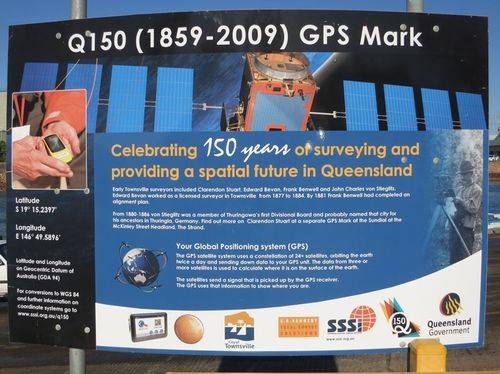
Home » Themes » Landscape » Settlement
Q150 GPS Mark Print Page 

The spatial sciences profession (surveyors, map makers and those who work with location information) placed over 60 GPS Marks at significant locations around Queensland during 2009 to celebrate Queensland's 150th anniversary and 150 years of surveying. The marks accurately depict latitude and longitude and provide the public with a means to check the accuracy of their in-car, in-boat and hand-held navigation devices.
The project was launched at the Museum of Lands, Mapping and Surveying in Brisbane on 24 June 2009.
Queensland's early explorers were often surveyors. Local members of SSSI (Surveying & Spatial Sciences Institute) Queensland will tell the stories of early surveyors and map makers by placing signs adjacent to many of the GPS Marks and celebrating 150 years of Queensland's history through public events celebrating the past and showcasing the future of the profession.
Location
| Address: | Sir Leslie Thiess Drive, The Boat Harbour, Townsville, 4810 |
|---|---|
| State: | QLD |
| Area: | AUS |
| GPS Coordinates: | Lat: -19.254 Long: 146.8265 Note: GPS Coordinates are approximate. |
Details
| Monument Type: | Plaque |
|---|---|
| Monument Theme: | Landscape |
| Sub-Theme: | Settlement |
Dedication
| Approx. Monument Dedication Date: | 2009 |
|---|
Q150 ( 1859 - 2009) GPS Mark
Celebrating 150 years of surveying and providing a spatial future in Queensland.
Early Townsville surveyors included Clarendon Stuart, Edward Bevan, Grank Benwell and John Charles von Stieglitz. Edward Bevan worked as a licensed surveyor in Townsville from 1877 to 1884. By 1881 Frank Benwell had completed an alignment plan.
From 1880 - 1886 von Stieglitz was a member of Thuringowa`s first Divisional Board and probably named that city for his ancestors in Thuringla, Germany. Find out more on Clarendon Stuart at a separate GPS Mark at the sundial at the McKinley Street headland, The Strand.
Your Global Positioning System (GPS)
The GPS satellite system uses a constellation of 24+ satellites, orbiting the earth twice a day and sending down data to your GPS unit. The data from three or more satellites is used to calculate where it is on the surface of the earth.
The satelittes send a signal that is picked up by the GPS receiver. The GPS uses that information to show you where you are.
Latitude S 19 15` 23.97"
Longitude E 146 49` 58.96"



